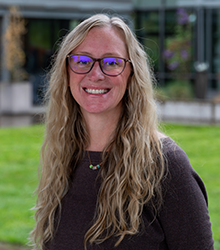
Sara Schmitt
Biography
Dr. Schmitt will not be accepting new PhD students for the 2026-2027 academic year.
Dr. Sara Schmitt is the Bricker-Squires Faculty Chair in Early Intervention and an Associate Professor in the Department of Special Education and Clinical Sciences. She is also a research scientist at the Prevention Science Institute, and a faculty member in the Prevention Sciences Graduate Program. Dr. Schmitt currently teaches and is on the Leadership Council for the Ballmer Institute. She was an Associate Professor and Co-Director of the Center for Early Learning at Purdue University prior to joining the faculty at the University of Oregon.
Dr. Schmitt’s research is generally centered around answering critical questions related to how children develop strong self-regulation, social-emotional competence, and school readiness during the early childhood period and how to best strengthen these skills prior to kindergarten entry. Specifically, her research agenda is focused on two areas: 1) identifying contextual and individual predictors of the development of self-regulation, social-emotional competence, and school readiness during early childhood, 2) designing and evaluating targeted interventions, curricula, and policies to enhance these skills in underserved children (e.g., those from socioeconomically disadvantaged populations). These research lines are in the service of detecting and preventing early learning problems and, ultimately, reducing socioeconomic disparities as children make their way through formal schooling. Dr. Schmitt’s research is funded by various federal, state, and foundation grants.
Dr. Schmitt is also interested in training practitioners to better support children’s development of self-regulation in early childhood. For example, she is currently leading training and implementation support efforts for a new early childhood curriculum (Early Learning Matters) that is being implemented in over 500 military child development classrooms worldwide, serving hundreds of thousands of children and families.
Education
Ph.D., 2013, Oregon State University
Major: Human Development and Family Sciences
M.A., 2009, San Diego State University
Major: Developmental Psychology
B.A., 2003, University of Wisconsin-Madison
Major: Psychology
Honors and Awards
2021 Society for the Study of Human Development Early Career Award
2021 Purdue University Trailblazer Outstanding Mid-Career Research Award
2020 Purdue Research Foundation International Travel award
Publications
Selected Publications:
Schmitt, S.A., Purpura, D. J., Duncan, R. J., Bryant,g L. M., Zehner,g T. M., Devlin,p B. L., Geer, p E. A., & Paes, p T. M. (2025). Testing block play as an effective mechanism for promoting early math, executive function, and spatial skills in preschoolers from low-income backgrounds. Early Childhood Research Quarterly, 71, 163-173.https://doi.org/10.1016/j.ecresq.2024.12.011
Schmitt, S.A., Duncan, R.J. Paes,p T. M., & Vandell, D. L. (2025). Identifying the onset of prediction from early cognitive skills to adult socioeconomic outcomes. Child Development, 96(6), 2017-2031. https://doi.org/10.1111/cdev.70006
Schmitt, S. A., Elicker, J. G., Purpura, D. J., Duncan, R. J., Schmerold,p K. Budrevich,g A., & Bryant,g L. M. (2023). The effects of a high quality state-run preschool program as rated by a Quality Rating and Improvement System on children’s school readiness. Early Childhood Research Quarterly, 62, 89-101.
Schmitt, S. A., Mihalec-Adkins,g B., Lipscomb, S. T., Pratt, M., & Horvath,g G. (2022). Longitudinal relations among child care stability during the prekindergarten year and behavior problems. Children and Youth Services Review, 138, 106522. https://doi.org/10.1016/j.childyouth.2022.106522
Schmitt, S. A., Finders,p J. K., Korucu,g I., Bryant,g L. M., Purpura, D. J., & Elicker, J. G. (2021). Examining transactional relations between behavioral self-regulation and social-emotional functioning during the transition to kindergarten. Developmental Psychology, 57, 2093-2105. https://doi.org/10.1037/dev0001266
Schmitt, S. A., Snyder, F., Korucu,g I., Bryant,g L. M., & Finders,p J. K. (2020). A brief, pilot intervention enhances preschoolers’ self-regulation and food liking. Journal of Nutrition Education and Behavior, 52, 1035-1042. doi:10.1016/j.jneb.2020.08.008
Schmitt, S. A., Duncan, R., Budrevich,g A., & Korucu,g I. (2020). Behavioral self-regulation moderates the association between preschool classroom quality and mathematical skills. Early Education and Development, 31, 323-334. doi:10.1080/10409289.2019.1660555
Schmitt, S. A., Purpura, D. J., & Elicker, J. (2019). Predictive links between vocabulary, mathematical language, and executive functioning in preschoolers. Journal of Experimental Child Psychology, 180, 55-68. doi:10.1016/j.jecp.2018.12.005
Schmitt, S. A., Korucu,g I., Napoli,g A. R., Bryant,g L., & Purpura, D. J. (2018). Using block play to enhance preschool children’s mathematics and executive function: A randomized controlled trial. Early Childhood Research Quarterly, 44, 181-191. doi:10.1016/j.ecresq.2018.04.006
Schmitt, S. A., Pratt, M., Schmerold,p K., Korucu,g I., & Napoli,g A. (2018) Preschool classroom quality and social-emotional functioning: Findings across the urban-rural continuum. Early Childhood Research Quarterly, 43, 11-22. doi:10.1016/j.ecresq.2017.11.002
Schmitt, S. A., Geldhof, G. J., Purpura, D. J., Duncan, R., & McClelland, M. M. (2017). Examining the relations between executive function, math, and literacy during the transition to kindergarten: A multi-analytic approach. Journal of Educational Psychology, 109, 1120-1140. doi:10.1037/edu0000193
Schmitt, S. A., McClelland, M. M., Tominey, S., & Acock, A. C. (2015). Strengthening school readiness for Head Start children: An evaluation of a self-regulation intervention. Early Childhood Research Quarterly, 30, 20-31. doi:10.1016/j.ecresq.2014.08.001
Research
Dr. Schmitt’s current research is focused on identifying various classroom-based strategies and interventions for promoting self-regulation and school readiness in children. She is particularly interested in advancing the research base on low-cost, feasible, and effective strategies for improving these skills in children from traditionally underserved communities.
